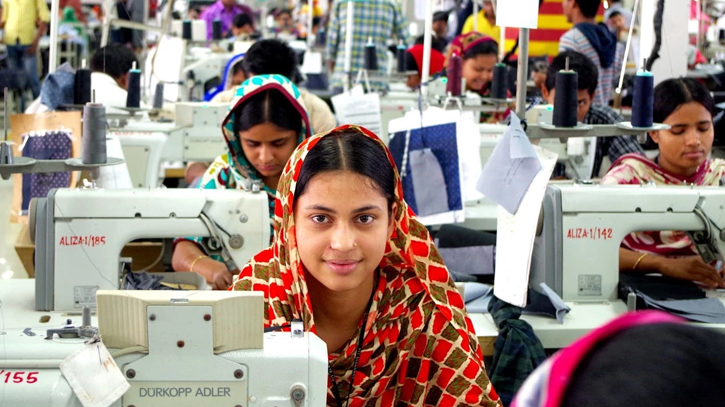
Photo : Collected
Over 400 ready-made garment factories may encounter issues regarding the payment of salaries and bonuses to workers during the upcoming Eid, with the majority being members of BGMEA and BKMEA.
Insiders in the sector have indicated that these factories face risks stemming from various factors, including financial crises and a lack of purchase orders. Consequently, reports from industrial police suggest potential dissatisfaction among workers in these factories before Eid.
According to concerned parties, the export-oriented garment industry is under pressure due to internal and global issues, such as a decrease in purchase orders and a gas crisis, which impact the timely payment of salaries and allowances to workers. Despite March nearing its end, many factories have yet to disburse February salaries, including Eid bonuses, exacerbating the crisis across other sectors.
In light of this situation, industrial police sources reveal that 416 factories are at risk, comprising 171 BGMEA members, 71 BKMEA members, 29 BTMA members, 13 BEPZA members, and 132 non-affiliated factories. The report was compiled based on data from 3,600 factories.
In this regard, Mohammad Hatem, Executive President of BKMEA, told The Daily Messenger, “The garment industry is facing severe crises. We are grappling with various issues, including banking crises, dwindling international orders, delayed payments for exports, and inadequate gas supply. Consequently, many garment owners are concerned about meeting workers’ salary and bonus obligations.”
BGMEA director Abdullah Hill Rakib told The Daily Messenger, “2024 poses significant challenges for us. Even reputable factory owners are experiencing hardships. Though not immediately visible, efforts are underway to address these issues. A responsible factory owner ensures timely payment of salaries and bonuses.”
Stakeholders in the sector said that while medium and small factories encounter salary and bonus problems annually, this time, many large factories are also at risk. However, the industrial police urge owners' organisations to intervene and resolve issues in these vulnerable factories while enhancing supervision.
Chief of Industrial Police Mahbubur Rahman said, “We expect every worker to receive their bonus at the start of the month. The decision by the Ministry of Labor regarding salary disbursement before Eid should be implemented by owners' organisations. Additionally, we advise increasing activity to prevent worker agitation.”
Meanwhile, the Bangladesh Garment Manufacturers and Exporters Association (BGMEA), the apex body representing garment industry owners, has revealed plans to disburse Eid bonuses between April 1 and 5 and March salaries between April 6 and 8. Amidst this situation, they have once again appealed to the government for short-term loans to alleviate the financial crisis.
Previously, Bangladesh underwent a strict lockdown starting from March 26, 2020, amidst the global spread of the coronavirus pandemic, posing significant challenges to the garment industry. During that period, the government established a fund to cover workers' wages for four consecutive months, providing incentives. This fund, amounting to approximately Tk 5,000 crore at a mere 4 percent interest, played a vital role in sustaining the country's primary export sector.
However, despite the resumption of normal exports post-COVID, there persists a tendency among garment industry owners to seek loans on favourable terms to cover workers' salaries and bonuses during Eid. Once again, garment owners are requesting low-interest loans to fulfill workers' payment obligations, reminiscent of the COVID period. Last year, they also sought guarantees for salary payments from December 2022 to March of the following year.
Garment industry owners have called upon the government to extend short-term loans, citing the financial strain in meeting workers' salary and bonus commitments before Eid-ul-Fitr. They attribute the downturn in clothing orders from major markets, including the United States, to the global economic recession. While goods worth $2.67 billion were exported in January this year, only $1.61 billion were exported in the first 20 days of March.
Syed Nazrul Islam, the first vice president of BGMEA, said that the country's garment sector is facing challenges. There are not as many product orders as before. However, production and labour costs have increased. Also, the desired profit margin is not being achieved. In this situation, garment owners have to face a tough challenge while paying a huge amount of salary and bonuses within just 8 days.
Earlier, a segment of workers instigated unrest in the garment sector in November and December, fuelled by rumours surrounding the formulation and implementation of a new wage structure. The repercussions of this violence, both domestically and internationally, continue to linger. Garment traders apprehend a recurrence of similar disturbances amid rumours concerning salary and bonus disbursements during the upcoming Eid season.
Messenger/Disha








